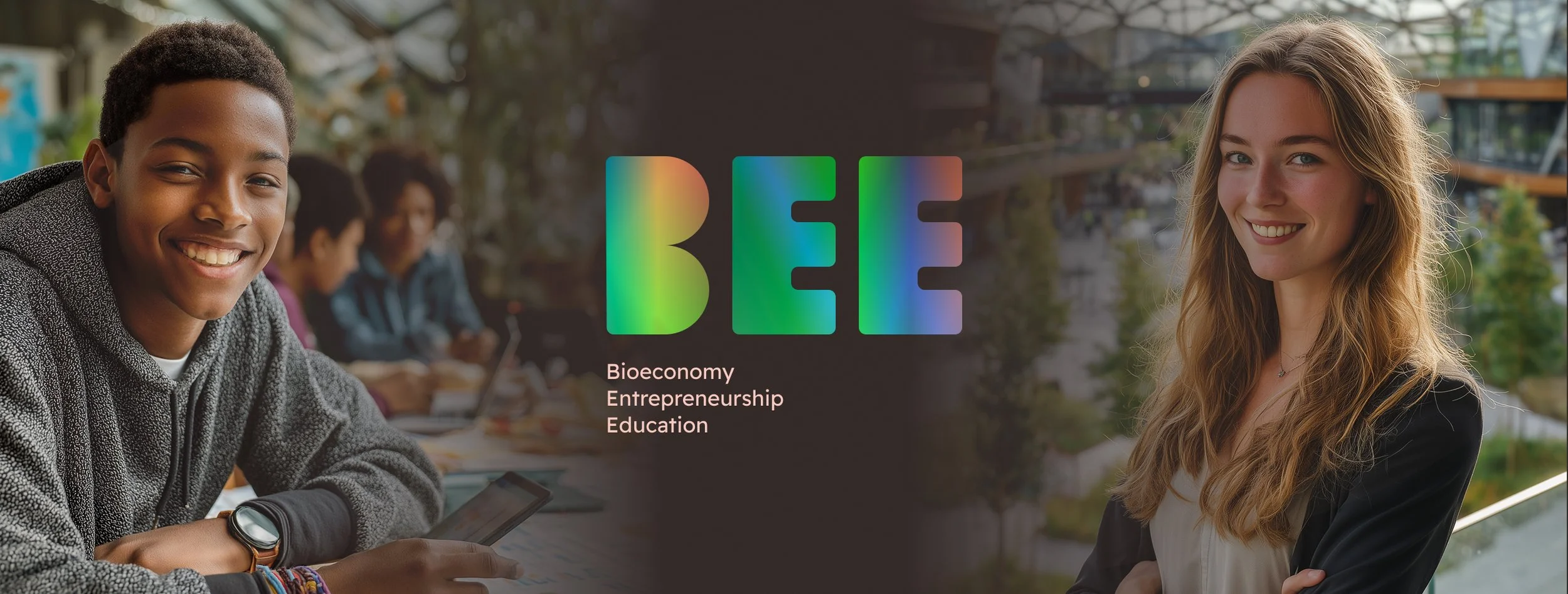
Bioeconomy Entrepreneurship Education (BEE)
Growing the next generation of green changemakers
Across Europe, we face a green skills gap. Fewer than 2% of 180 young people aged 16–18 we interviewed at partner schools can clearly explain what the bioeconomy is, even though the need for green jobs and skills are growing faster than ever.
At the same time, almost every young person says they care deeply about the planet.
But when asked what “entrepreneurship” means, most still answer:
“It’s about becoming rich.”
And who can blame them? Social media glorifies the image of the lone founder as influencer, driving success and luxury. But that’s not how real environmental change happens. Real change comes from collaboration, by connecting people, ideas, and opportunities across systems.
That’s why BEE exists: to help young people see entrepreneurship not as a race for profit, but as a pathway for purpose.
We aim to shift the story: from the influencer mindset to the changemaker mindset.
A changemaker is someone who understands problems deeply and connects others to build solutions. You don’t need to start a company to do that. Entrepreneurship, at its core, is a collective act for collective impact.
What is BEE?
BEE — Bioeconomy Entrepreneurship Education — is an Erasmus+ KA210 project running from September 2024 to August 2026, coordinated by DOON (Netherlands) and funded by the Erasmus+ Programme of the European Union.
Our mission is simple but urgent: to grow a new generation of green entrepreneurs who understand how systems work, who act with empathy, and who see entrepreneurship as a tool for transformation.
What we do
BEE is not another “how to pitch” program. It’s a transformative learning journey that helps students build:
Identity: seeing themselves as changemakers, not just founders.
Agency: realizing that entrepreneurship is a shared process, not a solo mission.
Systems literacy: learning to spot opportunities and gaps in complex systems.
The learning experience unfolds in three loops:
Ground: guided learning where students explore circular thinking, define challenges, make, release, and reflect on early ideas.
Grow: deeper autonomy as students research their own problem space and design bio-based solutions.
Go: the public stage where students pitch their ventures and share their impact stories.
Each module contains 8–12 lessons with teacher-friendly materials, videos, and flexible formats, so schools can easily adapt the program to their context.
When viewing on a mobile phone: click the three vertical dots and choose “view full screen” to view the presentation.
What’s planned
Over two years, the project brings together partners and educators from across Europe to co-create, test, and share a new model of entrepreneurship education.
Key activities include:
Mapping needs and skills — assessing what students and teachers know about bioeconomy and entrepreneurship.
Developing the BEE Playbook — a practical toolkit for teachers, combining systems thinking, circular economy, and entrepreneurship.
International teacher training — empowering educators to deliver the program in their classrooms.
Pilots in schools — testing BEE with students in Belgium, the Netherlands, and Greece.
Dissemination and engagement — organizing student contests, events, and a final conference to share lessons and inspire others.
The partnership
BEE unites five partners from three European countries:
DOON (Netherlands) — applicant and coordinator, expert in innovation and systems thinking in education.
RHIZO1 (Belgium) — leading secondary school network pioneering project-based learning.
Stanislascollege Praktijk (Netherlands) — practical education school focusing on sustainability and entrepreneurship.
1ο ΓΕΛ Νάουσας (Greece) — secondary school in a rural region, integrating bioeconomy and green thinking into learning.
EDUQUEST (Greece) — non-profit organization promoting sustainability and inclusion through education.
Together, we believe the bioeconomy is not only an economic opportunity but a new way of thinking about how humans and nature can create value together.
Our mission: from Ikigai to Wikigaia
Traditional entrepreneurship is driven by Ikigai — “what I love, what I can do, what I can earn, and what the world needs.”
At BEE, we take it a step further — toward Wikigaia:
“What we love and need, what we can build together, and what our planet and we can profit from.”
The future won’t be built by solo heroes but by teams of teams, connected by purpose, creativity, and care for our shared planet.
🌍 Get involved
Do you share this vision or want to bring BEE to your school?
We’d love to hear from you.
Questions or interest? Contact joos.vancauwenberghe@doon.nu, project coordinator at DOON.
Follow the project’s journey on this website and the upcoming Erasmus+ Project Results Platform.
Together, let’s grow the next generation of green changemakers.
Disclaimer
This project has received funding from the European Union’s Erasmus+ programme under project number 2022-2-NL01-KA210-SCH-000099271. The European Commission’s support for the production of this publication does not constitute an endorsement of the contents, which reflect the views only of the authors, and the Commission cannot be held responsible for any use which may be made of the information contained therein.

